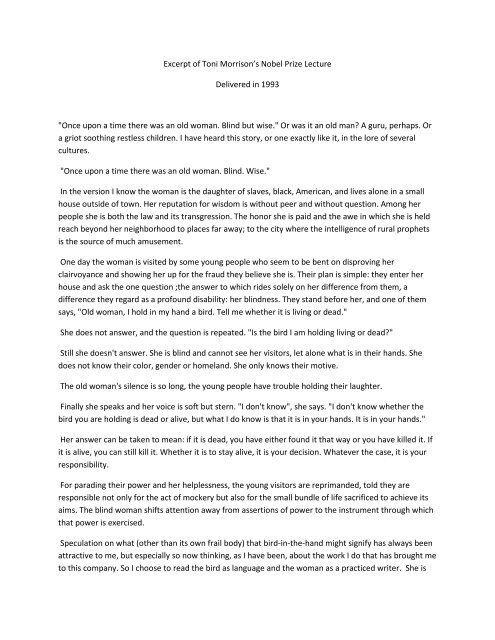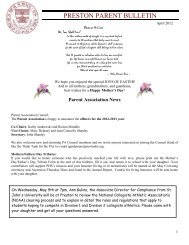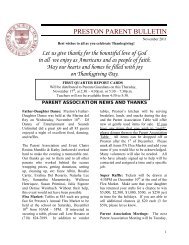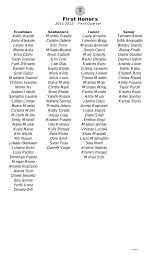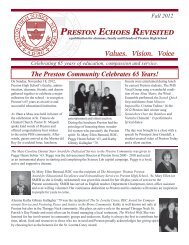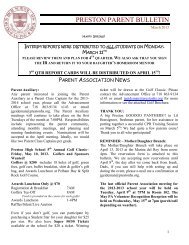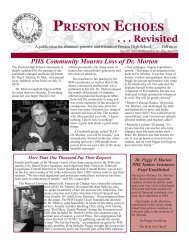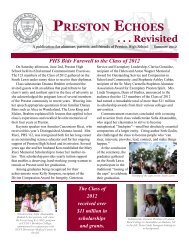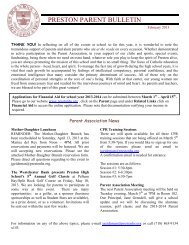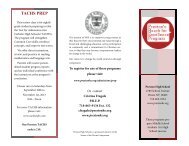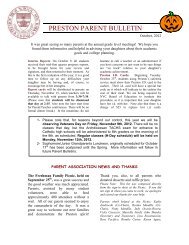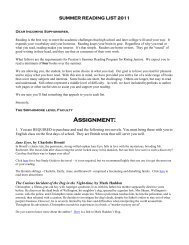1 speech excerpt from Toni Morrison - Preston High School
1 speech excerpt from Toni Morrison - Preston High School
1 speech excerpt from Toni Morrison - Preston High School
- No tags were found...
Create successful ePaper yourself
Turn your PDF publications into a flip-book with our unique Google optimized e-Paper software.
Excerpt of <strong>Toni</strong> <strong>Morrison</strong>’s Nobel Prize LectureDelivered in 1993"Once upon a time there was an old woman. Blind but wise." Or was it an old man? A guru, perhaps. Ora griot soothing restless children. I have heard this story, or one exactly like it, in the lore of severalcultures."Once upon a time there was an old woman. Blind. Wise."In the version I know the woman is the daughter of slaves, black, American, and lives alone in a smallhouse outside of town. Her reputation for wisdom is without peer and without question. Among herpeople she is both the law and its transgression. The honor she is paid and the awe in which she is heldreach beyond her neighborhood to places far away; to the city where the intelligence of rural prophetsis the source of much amusement.One day the woman is visited by some young people who seem to be bent on disproving herclairvoyance and showing her up for the fraud they believe she is. Their plan is simple: they enter herhouse and ask the one question ;the answer to which rides solely on her difference <strong>from</strong> them, adifference they regard as a profound disability: her blindness. They stand before her, and one of themsays, "Old woman, I hold in my hand a bird. Tell me whether it is living or dead."She does not answer, and the question is repeated. "Is the bird I am holding living or dead?"Still she doesn't answer. She is blind and cannot see her visitors, let alone what is in their hands. Shedoes not know their color, gender or homeland. She only knows their motive.The old woman's silence is so long, the young people have trouble holding their laughter.Finally she speaks and her voice is soft but stern. "I don't know", she says. "I don't know whether thebird you are holding is dead or alive, but what I do know is that it is in your hands. It is in your hands."Her answer can be taken to mean: if it is dead, you have either found it that way or you have killed it. Ifit is alive, you can still kill it. Whether it is to stay alive, it is your decision. Whatever the case, it is yourresponsibility.For parading their power and her helplessness, the young visitors are reprimanded, told they areresponsible not only for the act of mockery but also for the small bundle of life sacrificed to achieve itsaims. The blind woman shifts attention away <strong>from</strong> assertions of power to the instrument through whichthat power is exercised.Speculation on what (other than its own frail body) that bird-in-the-hand might signify has always beenattractive to me, but especially so now thinking, as I have been, about the work I do that has brought meto this company. So I choose to read the bird as language and the woman as a practiced writer. She is
convinced that when language dies, out of carelessness, disuse, indifference and absence of esteem, orkilled by fiat, not only she herself, but all users and makers are accountable for its demise. In her countrychildren have bitten their tongues off and use bullets instead to iterate the voice of <strong>speech</strong>lessness, ofdisabled and disabling language, of language adults have abandoned altogether as a device for grapplingwith meaning, providing guidance, or expressing love. But she knows tongue-suicide is not only thechoice of children. It is common among the infantile heads of state and power merchants whoseevacuated language leaves them with no access to what is left of their human instincts for they speakonly to those who obey, or in order to force obedience.Sexist language, racist language, theistic language –all are typical of policing languages of mastery, andcannot, do not permit new knowledge or encourage the mutual exchange of ideas.The old woman is keenly aware that no intellectual mercenary, no insatiable dictator, no paid-forpolitician or demagogue; no counterfeit journalist would be persuaded by her thoughts. There is and willbe rousing language to keep citizens armed and arming; slaughtered and slaughtering in the malls,courthouses, post offices, playgrounds, bedrooms and boulevards; stirring, memorializing language tomask the pity and waste of needless death. There will be more diplomatic language to countenancerape, torture, assassination. There is and will be more seductive, mutant language designed to throttlewomen, to pack their throats like paté-producing geese with their own unsayable, transgressive words;there will be more of the language of surveillance disguised as research; of politics and historycalculated to render the suffering of millions mute; language glamorized to thrill the dissatisfied andbereft into assaulting their neighbors; arrogant pseudo-empirical language crafted to lock creativepeople into cages of inferiority and hopelessness.She has thought about what could have been the intellectual history of any discipline if it had notinsisted upon, or been forced into, the waste of time and life that rationalizations for andrepresentations of dominance required - lethal discourses of exclusion blocking access to cognition forboth the excluder and the excluded.The conventional wisdom of the Tower of Babel story is that the collapse was a misfortune. That it wasthe distraction, or the weight of many languages that precipitated the tower's failed architecture. Thatone monolithic language would have expedited the building and heaven would have been reached.Whose heaven, she wonders? And what kind? Perhaps the achievement of Paradise was premature, alittle hasty if no one could take the time to understand other languages, other views, other narrativesperiod. Had they, the heaven they imagined might have been found at their feet. Complicated,demanding, yes, but a view of heaven as life; not heaven as post-life.Be it grand or slender, burrowing, blasting, or refusing to sanctify; whether it laughs out loud or is a crywithout an alphabet, the choice word, the chosen silence, unmolested language surges towardknowledge, not its destruction. But who does not know of literature banned because it is interrogative;discredited because it is critical; erased because alternate? And how many are outraged by the thoughtof a self-ravaged tongue?
Word-work is sublime, she thinks, because it is generative; it makes meaning that secures ourdifference, our human difference - the way in which we are like no other life.We die. That may be the meaning of life. But we do language. That may be the measure of our lives."Once upon a time, ..." visitors ask an old woman a question. Who are they, these children? What didthey make of that encounter? What did they hear in those final words: "The bird is in your hands"? Asentence that gestures towards possibility or one that drops a latch? Perhaps what the children heardwas "It's not my problem. I am old, female, black, blind. What wisdom I have now is in knowing I cannothelp you. The future of language is yours."They stand there. Suppose nothing was in their hands? Suppose the visit was only a ruse, a trick to getto be spoken to, taken seriously as they have not been before? A chance to interrupt, to violate theadult world, its miasma of discourse about them, for them, but never to them? Urgent questions are atstake, including the one they have asked: "Is the bird we hold living or dead?" Perhaps the questionmeant: "Could someone tell us what is life? What is death?" No trick at all; no silliness. A straightforwardquestion worthy of the attention of a wise one. An old one. And if the old and wise who have lived lifeand faced death cannot describe either, who can?But she does not; she keeps her secret; her good opinion of herself; her gnomic pronouncements; herart without commitment. She keeps her distance, enforces it and retreats into the singularity ofisolation, in sophisticated, privileged space.Nothing, no word follows her declaration of transfer. That silence is deep, deeper than the meaningavailable in the words she has spoken. It shivers, this silence, and the children, annoyed, fill it withlanguage invented on the spot."Is there no <strong>speech</strong>," they ask her, "no words you can give us that helps us break through your dossierof failures? Through the education you have just given us that is no education at all because we arepaying close attention to what you have done as well as to what you have said? To the barrier you haveerected between generosity and wisdom?"We have no bird in our hands, living or dead. We have only you and our important question. Is thenothing in our hands something you could not bear to contemplate, to even guess? Don't you rememberbeing young when language was magic without meaning? When what you could say, could not mean?When the invisible was what imagination strove to see? When questions and demands for answersburned so brightly you trembled with fury at not knowing?"Do we have to begin consciousness with a battle heroines and heroes like you have already fought andlost leaving us with nothing in our hands except what you have imagined is there? Your answer is artful,but its artfulness embarrasses us and ought to embarrass you. Your answer is indecent in its selfcongratulation.A made-for-television script that makes no sense if there is nothing in our hands.
"Why didn't you reach out, touch us with your soft fingers, delay the sound bite, the lesson, until youknew who we were? Did you so despise our trick, our modus operandi you could not see that we werebaffled about how to get your attention? We are young. Unripe. We have heard all our short lives thatwe have to be responsible. What could that possibly mean in the catastrophe this world has become;where, as a poet said, "nothing needs to be exposed since it is already barefaced." Our inheritance is anaffront. You want us to have your old, blank eyes and see only cruelty and mediocrity. Do you think weare stupid enough to perjure ourselves again and again with the fiction of nationhood? How dare youtalk to us of duty when we stand waist deep in the toxin of your past?"You trivialize us and trivialize the bird that is not in our hands. Is there no context for our lives? Nosong, no literature, no poem full of vitamins, no history connected to experience that you can pass alongto help us start strong? You are an adult. The old one, the wise one. Stop thinking about saving yourface. Think of our lives and tell us your particularized world. Make up a story. Narrative is radical,creating us at the very moment it is being created. We will not blame you if your reach exceeds yourgrasp; if love so ignites your words they go down in flames and nothing is left but their scald. Or if, withthe reticence of a surgeon's hands, your words suture only the places where blood might flow. We knowyou can never do it properly - once and for all. Passion is never enough; neither is skill. But try. For oursake and yours forget your name in the street; tell us what the world has been to you in the dark placesand in the light. Don't tell us what to believe, what to fear. Show us belief s wide skirt and the stitch thatunravels fear's caul. You, old woman, blessed with blindness, can speak the language that tells us whatonly language can: how to see without pictures. Language alone protects us <strong>from</strong> the scariness of thingswith no names. Language alone is meditation."Tell us what it is to be a woman so that we may know what it is to be a man. What moves at themargin. What it is to have no home in this place. To be set adrift <strong>from</strong> the one you knew. What it is tolive at the edge of towns that cannot bear your company."Tell us about ships turned away <strong>from</strong> shorelines at Easter, placenta in a field. Tell us about awagonload of slaves, how they sang so softly their breath was indistinguishable <strong>from</strong> the falling snow.How they knew <strong>from</strong> the hunch of the nearest shoulder that the next stop would be their last. How,with hands prayered in their sex, they thought of heat, then sun. Lifting their faces as though it wasthere for the taking. Turning as though there for the taking. They stop at an inn. The driver and his matego in with the lamp leaving them humming in the dark. The horse's void steams into the snow beneathits hooves and its hiss and melt are the envy of the freezing slaves."The inn door opens: a girl and a boy step away <strong>from</strong> its light. They climb into the wagon bed. The boywill have a gun in three years, but now he carries a lamp and a jug of warm cider. They pass it <strong>from</strong>mouth to mouth. The girl offers bread, pieces of meat and something more: a glance into the eyes of theone she serves. One helping for each man, two for each woman. And a look. They look back. The nextstop will be their last. But not this one. This one is warmed."
It's quiet again when the children finish speaking, until the woman breaks into the silence."Finally", she says, "I trust you now. I trust you with the bird that is not in your hands because you havetruly caught it. Look. How lovely it is, this thing we have done - together."--------------------------------------------------------------------------------Copyright © The Nobel Foundation 1993TO CITE THIS PAGE:MLA style: "<strong>Toni</strong> <strong>Morrison</strong> - Nobel Lecture". Nobelprize.org. 23 Apr 2012http://www.nobelprize.org/nobel_prizes/literature/laureates/1993/morrison-lecture.html
Questions on <strong>Toni</strong> <strong>Morrison</strong>’s Nobel SpeechBackgroundThis <strong>speech</strong> was delivered by <strong>Toni</strong> <strong>Morrison</strong> at the Nobel Prize awards in 1993, the year she became aNobel laureate for literature. The <strong>speech</strong> tells the story of an old, wise, blind Black woman and thechildren who try to trick her and wind up learning a great deal. The story itself is an extended metaphorabout language.DirectionsRead the <strong>excerpt</strong> of <strong>Toni</strong> <strong>Morrison</strong>’s Nobel Speech and answer the following questions for your firstassignment when you return to school in the Fall.Look up words you don’t know and write a definition. Be prepared for a vocabulary test on these words.Summarize the point of the <strong>speech</strong>. What is the main idea/thesis?Questions:1. According to <strong>Morrison</strong>, what does the bird in the children’s hands represent?2. What does the old woman mean when she says of the bird:“I don’ t know whether the bird you are holding is dead or alive, but what I do know is that it is in yourhands. It is in your hands”? Why do you think she repeats – “It is in your hands.” How has this phrasebecome a metaphor? What is it a metaphor for?3. How does the statement: “In her country children have bitten their tongues off and use bulletsinstead to iterate the voice of <strong>speech</strong>lessness,of disabled and disabling language, of language adultshave abandoned altogether as a device for grappling with meaning, providing guidance, or expressinglove…” relate to how the adults in The Bluest Eye communicate with the children in the novel? Howmight Cholly relate to this idea?
4. What do you think <strong>Morrison</strong> means when she writes:“Sexist language, racist language, theistic language – all are typical of the policing languages of mastery,and cannot and do not permit new knowledge or encourage the mutual exchange of ideas.” Identifyand record at least two examples of sexist and racist language each <strong>from</strong> the novel – note who uses thelanguage and when it is used. Why might the user choose this language? How might the use havemastery? What does the phrase “language of mastery” mean?5. Re-read the paragraph that begins with “The conventional wisdom of the Tower of Babel story is thatthe collapse was a misfortune… complicated,demanding, yes, but a view of heaven is life, not heaven aspost-life.”How does <strong>Morrison</strong>’s point about achieving heaven as life through diversity and acceptance ofdifference relate to the story of Pecola in The Bluest Eye?6. <strong>Morrison</strong> uses language to combat sexism and racism through writing The Bluest Eye. How does shewage this battle. Provide examples.


